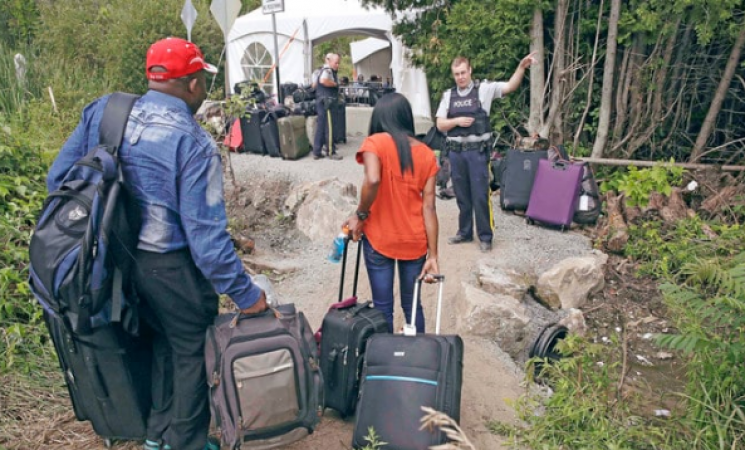
Montreal: Colima, Mexico, was like a war zone to live in, with shootings, burning cars and bodies left outside schools, according to Pedro Meraz.
He knew he had to leave when his wife, Rocio Gonzalez, a 28-year-old lawyer who worked with abused women, began receiving death threats from a cartel and local officials ignored her cries for help.
The University of Colima, located near the Pacific coast and about 485 kilometers west of Mexico City, has appointed 41-year-old Meraj as a professor. "They knew where we lived and what cars we drove," he claimed. If you think you are going to lose your life or the life of one of your daughters, then I have no problem in starting again.
Also Read: Beirut's "neighbourhood watch" recalls the city's troubled past
The family is part of a spike in Mexican asylum applications in Canada this year. More than 8,000 Mexican citizens applied for refugee status in Canada in 2022 due to the relative ease of the process compared to the US, the lack of visas for travel between Mexico and Canada, and the threat of violence at home.
That's more than double that of 2019, the last year before the COVID-19 pandemic and accompanying travel restrictions, and nearly five times that of 2018. Most of them are arriving via one of the many direct flights to and from Mexico, Montreal.
Viviana Tapia Gonzalez, a human rights advocate and mother of four from Aguascalientes, a town about 425 kilometers northwest of Mexico City, is one of them.
He claims to have left Mexico in January after a military raid. She claimed that she became a target because of her work with the families of missing and murdered women and girls.
The death threat was ongoing, he claimed. "I believed this was my last, safest option. I help a lot of people and work for a lot of causes. Although I didn't want to stop helping, I also needed to take care of myself." Was.
To avoid having her asylum request denied, Tapia Gonzalez has been living in a women's shelter in Montreal. If her claim is denied, she will not be alone.
The claims of more than 2,700 Mexican asylum seekers were processed by the Immigration and Refugee Board of Canada in the first nine months of 2022. This independent tribunal investigates and adjudicates asylum cases.
According to Christian Tessier, a spokesman for the IRB, 1,032 of them were accepted, 1,256 were rejected, and the remaining 400 were either abandoned, withdrawn, or had other consequences.
Also Read: Our goal is to become the world's largest nuclear power: Kim Jong-un
The United Nations defines a "convention refugee" as a person who is outside their home country and has a well-founded fear that they will be persecuted if they return because of their race, religion, political opinion, nationality or social membership. They will have to face harassment. group.
To be eligible for refugee status in Canada, a claimant must meet this definition. If not, they must demonstrate that they are in need of protection and are unable to return safely to their home countries without risk of being subjected to torture, cruel or unusual punishment, or even death.
However, despite the possibility of denial, the number of Mexicans applying for refugee status in Canada continues to increase. Half of the group's current clients, according to The Welcome Collective, a Montreal-based nonprofit that provides necessities to new asylum seekers, are from Mexico, a 300 percent increase since the beginning of the year.
They had to flee due to violence and other humanitarian issues. To find a better place for their children," explained Flavia Leiva, volunteer and social outreach coordinator for the organization. Leiva hypothesized that social media could be contributing to the increase in applications.
She said that "YouTubers and some TikTok videos have talked about how easy it is to get into Canada." At least one YouTube video made for a Mexican audience and released 10 months ago, with more than 4 million views, explains the Canadian immigration process in Spanish.
Since the start of the pandemic, it has become more challenging for Mexicans to apply for asylum in the US. Mexicans have been disproportionately affected by a US public health regulation that suspends the right to apply for asylum on grounds of preventing the spread of COVID-19. Since its introduction in March 2020, Title 42 authority has been used to expel immigrants more than 2.4 million times.
The fact that Mexican citizens no longer require a visa to enter Canada since the Canadian government removed the requirement in late 2016 further adds to the country's allure.
Also Read: Such a fan reached Fifa World Cup, People of Islamic country angry after seeing clothes
Leiva added that given their perception of safety, more Mexicans may be choosing to travel to Canada rather than the US. "They are kept in cages in the US, and the conditions are not as good," Leiva claimed. "People don't feel protected or safe." Meraz claimed that he and his family came to the conclusion that Canada would give them the best opportunity to start over. He said, "My wife looked into whether there are international treaties to protect those who are at risk. He mentioned the laws and policies that protect women and children in Canada, as well as the relatively low crime rate in that nation.